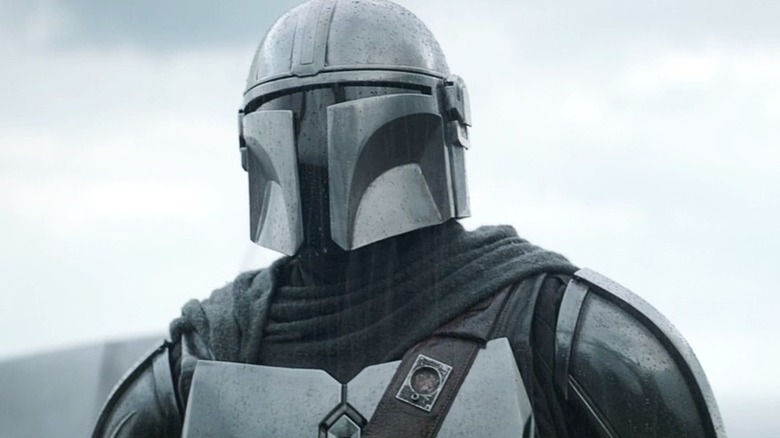How The Mandalorian Dealt With Clone Wars Lore That Contradicted Season 1
"The Mandalorian" is back with a third season on Disney+ after a two-year wait. One of the central storylines this season features Din Djarin (Pedro Pascal) traveling to the ruined Mandalore to bathe in the Living Waters under the Mines of Mandalore. Why does he have to do this? Din has done something a certain sect of Mandalorians isn't supposed to; he has removed his helmet in front of others. This makes him an apostate to his group, though other Mandalorians like Bo-Katan Kryze (Katee Sackhoff) scoff at him for doing so.
Din has removed his helmet a few times, most gut-wrenchingly when Grogu left with Luke Skywalker to continue his Jedi training. (If that scene didn't gut you, your heart is a shriveled raisin.) This helmet issue and the split within the Mandalorian ranks (both now and during their history) have been central themes of the show. Whether it will change or not will depend on where the story goes, what he learns while on Mandalore, and how much time the very busy Pedro Pascal can spend in that suit in person while he's straddling two hit shows (the other one is "The Last of Us," in case you haven't turned on your devices in an age).
For fans of "Star Wars: The Clone Wars" and every other show or film set in a galaxy far, far away, this whole thing was a surprise. We were used to seeing, say, Satine Wren (Tiya Sircar) in "Star Wars Rebels" and Jango and Boba Fett in the prequels without helmets, and no one seemed surprised. Creator Jon Favreau recently spoke to FilmStories.co.uk about adding this in and dealing with the contradiction in "Star Wars" lore.
Becoming an apostate
Look, Mandalorian armor is cool. I get it. I have a Boba Fett helmet in the trunk of my car. The design is incredibly cool. Still, not taking it off ... even when you're with your children or partner? It's intense.
Din was a foundling adopted by The Children of the Watch (formerly known as the Death Watch), which has been described as both a sect and a cult (by Bo-Katan) that stayed separate from the rest of the society. Once you are given your armor in this group, you never remove your helmet. You can eat, drink, and bathe — alone — but it stays on the rest of the time. That's not an easy ask. I mean, as he tells another character, no one will hurt him for removing it, but once he has, he can't put it back on.
Whichever side you subscribe to, it's hardly something we haven't seen before in the religions of our own world. Some require a head covering at different times, a certain style of dress, the wearing of a symbol, etc. This one is rather extreme, though, surprising viewers who wanted to see Pedro Pascal's face. Pascal has even said he can't see very well in it.
Narratively it works very well. It's a strong code that our hero adheres to, which is something we often see in other forms in the Western genre, which "The Mandalorian" often emulates. It just goes against what we've seen of this group of people before.
'It's the same reality, and now we have to deal with it'
In the interview, Favreau was asked about planning season 3 from a central idea. Favreau mentioned the helmet issue right away. He said:
"There were a lot of things we laid out in the first season — like Mandalorians can't take the helmets off — and then people are curious about 'Well, I saw a lot of Mandalorians taking their helmets off in 'The Clone Wars,' is it two different realities?' And, you know, we took the path that 'No, it's the same reality, and now we have to deal with it.'"
He mentioned looking at the tensions that might cause. Again, it's certainly something we've seen in our own world, with some people trying to police the clothing and religious choices of others. Favreau said the team looked at "allegories in the real world, historically." He said:
"George [Lucas] was always great about referencing — like Rome when the Senate is dissolved, and now the Emperor has taken over the democracy disappears. We look for those patterns in the real world and try to use those as structural inspiration. So what happens with a warlike culture where its people have different levels of adherence to whatever their dogma is?"
It will be fascinating to see whether Din concludes that his sect is imposing something that isn't helpful or that the idea of sticking to rules for faith's sake is the better choice for him.
"The Mandalorian" season 3 is currently streaming on Disney+ with new episodes on Wednesdays.


